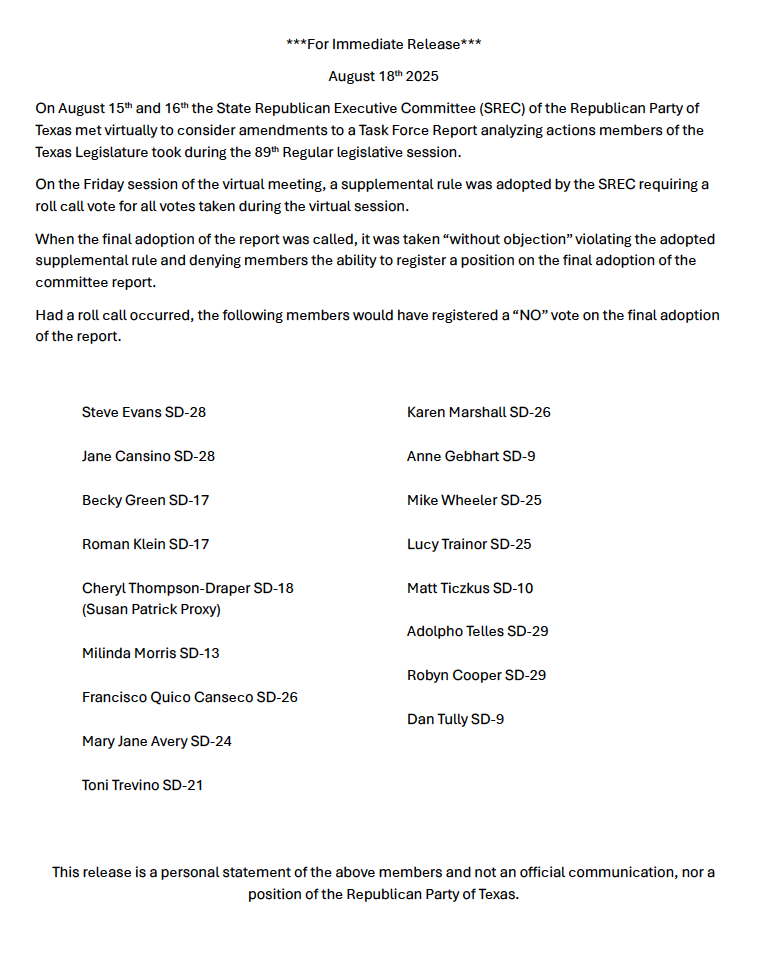- The State Republican Executive Committee met via Zoom on Friday and Saturday to debate and approve a final Legislative Task Force Report that could lay the groundwork to censure Republican legislators and potentially bar them from the GOP Primary ballot
- The final report excluded several actions included in the Party’s preliminary report, reducing the number of legislators with three or more censure strikes from 42 down to 3
- Some SREC members have noted that the report adopted by the SREC is limited to the Party’s legislative priorities, and local Party organizations can still censure lawmakers on additional grounds
The State Republican Executive Committee (SREC) – the governing body of the Republican Party of Texas – met over Zoom for six hours throughout Friday and Saturday evenings to debate changes to the Party’s Legislative Task Force Report.
A preliminary version of the report was debated and approved by the SREC on August 8. Copies of the initial report were distributed to lawmakers, who were invited to submit comments to the Party that were considered during final deliberations.
Under Rule 44 of the Republican Party of Texas Rules, lawmakers who are deemed to have taken three or more actions contrary to the Party’s legislative priorities or core principles can be subject to censure resolutions. Under an amendment to Rule 44 adopted by delegates to the Republican Party of Texas State Convention last year, censured lawmakers could potentially be barred from the Republican Primary ballot. Critics of this Rule 44 “death penalty” argue that it would not likely survive a legal challenge.
On Friday, Amarillo businessman Alex Fairly announced that his Texas Republican Leadership Fund was prepared to “fully fund” a legal challenge to any attempt by the Republican Party of Texas to deny Primary ballot access to a censured officeholder.
“The discussions taking place by the State Republican Executive Committee to block candidates from appearing on the primary ballot is not only unlawful, it’s disastrous for the Republican Party of Texas,” said Fairly.
“For generations, voters have decided the fate of their leaders at the ballot box, and that’s core to the foundation of our Republic. l’ve personally supported challengers to Republican incumbents in the past, but the decision belongs to the voters. Letting a handful of insiders dictate who can run in our primaries undermines both our party’s core principles and the First Amendment. If the SREC moves forward with this attempt to silence millions of Texas Republicans, the Texas Republican Leadership Fund PAC will fully fund and launch a legal challenge.”
While one State Senator and 41 members of the Texas House incurred three or more censure strikes under the preliminary report, the final report removed several actions that caused dozens of lawmakers to incur censure strikes. Under the final report, three legislators incurred three or more censure strikes.
State Representative Ken King incurred 14 censure strikes, retiring State Senator Robert Nichols incurred six strikes, and State Representative Dade Phelan incurred three strikes. King serves as Chairman of the State Affairs committee in the Texas House, and the bulk of his censure strikes were related to bills that failed to advance out of his committee.
Among the actions the SREC ultimately decided not to include in the final report was seconding a motion by State Representative Jared Patterson to end debate on the Texas House rules. The SREC voted 39-17 to remove this action from the report, which removed a censure strike from 47 Republican State Representatives. A related action on the Texas House rules, to vote for Patterson’s motion to end debate, remained as a censure strike in the final report.
Those who advocated for removing seconding the motion to end debate as a censure strike argued that it was unfair to penalize legislators twice for what was essentially one action. Republican Party of Texas Abraham George argued in favor of not including seconding Patterson’s motion to end debate as a censure strike against lawmakers.
“We should not give clearance to censure on the same topic two different times,” said George.
Other censurable actions that the SREC voted to remove from the preliminary report included votes for House Bill 805, a bill relating to a study by the Public Utility Commission of Texas on the interconnection of electric transmission service facilities with the United Mexican States, and House Bill 1359, relating to a program to provide assistance for certain retail electric customers.
While the SREC had initially voted to include House Bill 805 as a censure strike during its meeting on Friday, that vote was reconsidered when the SREC reconvened on Saturday. Those who advocated for not including House Bills 805 and 1359 as censure strikes argued that the bills had, at best, a tenuous connection to the Party’s “Secure the Electric Grid” legislative priority and that the Party did not actively engage with lawmakers to express opposition to those bills.
The meeting became boisterous at times. During debate over a proposed censure strike against State Representative Todd Hunter, the Chairman of the Texas House Calendars committee, SREC member Rolando Garcia noted that Hunter had “gone out of his way to be helpful” to the Party and that it would be unfairly punitive to create a situation where anybody serving as Chairman of the Calendars committee would be penalized for bills failing to make it out of that committee.
“Todd Hunter has actually gone out of his way to be helpful with the [Party]. A lot of reps give us the finger, and they’re just total assholes to us. But Todd Hunter – who doesn’t need anything from [the Party] and there’s nothing we can give him – still goes out of his way to be helpful for us,” said Garcia, who added, “I’m begging you all, let’s please stop shitting all over our friends.”
The SREC voted to remove the proposed censure strikes against Hunter.
While only three lawmakers incurred three or more censure strikes in the Party’s Legislative Task Force Report, multiple SREC members noted that the report was limited to the Party’s legislative priorities and that local Party organizations could still censure members on additional grounds.
“Many [legislators] have strikes regarding Preamble Republican Party Principles. It ain’t over yet,” wrote SREC member Paul Hale in a comment posted on Facebook.
In a post on X, SREC member Jeremy Story wrote, “As a member of the SREC, let me be clear. The report we voted on IS NOT meant to be comprehensive. It is a guide. That is the final statement at the end of the report. In other words, any censure must originate from a local county executive committee and that committee can choose whatever they think is a violation of our platform principles and preamble (at the top of the platform Document) and/or legislative priorities. Censures originate locally. We at the SREC can concur if the resolution is sent to us for consideration and can assign penalties but, the censure has to originate locally. They are not limited to what is in our report.”
Republican Party of Texas Chairman Abraham George declared the Legislative Task Force Report to have passed “without objection” at the end of Saturday’s Zoom meeting even though the SREC had adopted a motion on Friday by Legislative Task Force Chairman Lisa Hendrickson to hold a roll call vote on “all votes taken during this meeting related to the legislative priorities task force report.” Several SREC members have expressed a desire to register opposition to the final report.
UPDATE (8/18/25): 17 members of the SREC released a joint statement Monday afternoon registering their opposition to the final Legislative Task Force Report.








